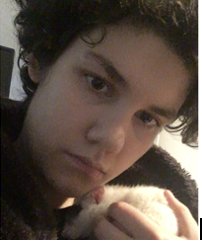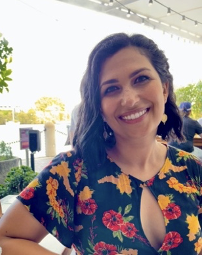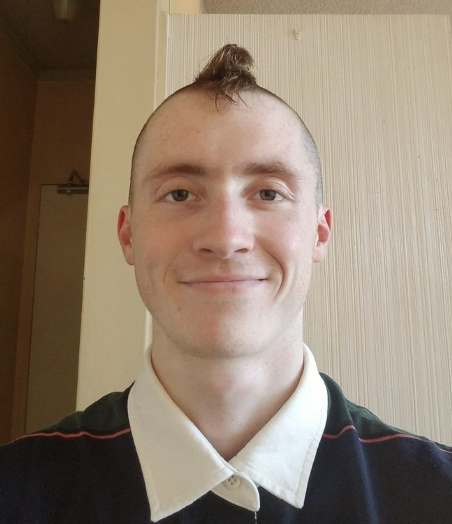She is stitched to her destiny with golden thread, needles stabbed through her fingertips to tug her along. In a cottage choked by ivy and honeysuckle, she is clothed in pale pink and dark brown, sickening fairy floss and sturdy trees. She dreams in false memories: a mother and a father, a queen and a king, a cradle soft and safe, a spell ghostly and green.
She holds a candle close to her finger so she can see the shadow of the bone. She worries her skin will melt like spun sugar sucked into nothingness. She worries she will fall into the strange dreams and be stuck as a baby, shrouded in embroidered silk and the sharp curse of a disregarded witch.
She learns how to stifle her waking scream. She treks into the woods to scream. She climbs trees. She falls out of trees. She learns to tie her shoes. She grows out of her shoes. She bakes cakes. She burns cakes. She learns to sew clothes. She grows out of her clothes. She rips her clothes. She learns how to mend clothes.
She is strictly supervised by her godmothers when she has a needle in her hand, fingers tightly wound with tape, jammed with thimbles. They perch next to her or hover in front of her, wringing their hands as if they’re struggling to stop themselves from reaching out and snatching the fabric and needle and thread away. She is not allowed to hold the knives when she helps them cook, instead measuring out shards of sugar and messy clouds of flour with smooth wooden spoons, tipping careful quantities into glass bowls and thick-bottomed pans, stirring and sifting and staring out the window at the forest.
She decides that her skin must be made of paper, although she has been out in the rain many times and she has not yet dissolved. If she were to be nicked or stabbed or sliced, the wound would not heal, and her own heart would pump her determinedly into death.
She walks through the woods, grass wet beneath her feet, leaves whirring overhead like shimmering beetle wings. Sunlight slides through the gaps in the branches like drops of honey. She is searching for something freshly mythical, like always. She’s so used to seeing the magical in the mundane that it’s lost its charm. She wants wonder again, and so she worms her way out of chores and worry, sprints through the trees, picks bright handfuls of wildflowers to display in a vase or press dry or twist into a crown.
Their saturated stems snarl around her fingers as she stumbles steadily deeper. The trees grow closer together here, tangled around each other, making her feel like an ant trotting through a maze of grass. The green grows deeper, dimmer, darker. Her body absorbs the shadowy shade, eyes adjusting, shivers stopping.
There is a crack of golden light in the distance. Her eyes spill open. The trees block her path, tripping her on their roots and bumping her to the ground with their trembling trunks. She makes a game of it, laughing as she dives and delves through the army of green and brown. The rough texture scrapes threateningly at her skin and she stops her laughter, pulling out of the claw-like clutches and struggling into a mad dash towards the flourish of phosphorescence. She squeezes through the splintering branches and finds herself in a clearing. The space is awash with the movement of spiralling colour, grass gleaming with remnants of dew, flickering butterflies, glinting beetles, swaying flowers.
A boy stands in sharp relief against the softness. He is perfectly still, staring at her. He looks too human for such a pretty place, except for the staggering sunlight making his skin glow gold and his hair gleam white-hot, like a melting candle.
‘Hello,’ she says. ‘Are you the magic?’
‘I am the monster,’ he says proudly.
‘You don’t look much like a monster,’ she says, chin high, as if she’s seen many monsters to compare him to.
He bares his teeth and she recoils, but then steps towards him, dropping her flowers to grab his chin to stare at them.
‘Wow,’ she says, because his teeth are monstrous. There are too many of them. They stick out at strange angles, sharp grey triangles, jagged slices of shattered slate shoved into his gums. She pokes the flat edge of one. He snaps at her finger, shrieking with laughter at her gasp of fear. She hits him once, misses twice, falls over her own laughter and ends up lying on the grass.
He flops down beside her.
‘If you bit me, I would die,’ she tells him, sitting up to face him.
‘No, you wouldn’t. I would save you. I would bandage you up.’
‘It wouldn’t work. If I bleed, I die.’ She says it with affected casualness.
‘Why?’
‘My skin is made of paper.’
He pokes her.
‘No it’s not. Your skin is made of skin. Same as mine.’ He places a finger under her wrist to guide her hand into the air, pressing his palm against hers once she holds the position. His hand is warm, browned by the sun and radiating the absorbed heat. He curves the tops of his fingers over hers.
‘How did you become a monster?’ she asks. He drops his hand away from hers, busies himself with gathering up her scattered flowers, sorting them into piles of colour: daisies like folded paper, poppies like frozen fire, hyacinths like small blue stars, pale pink wild roses like blood that’s too set in to be properly washed out.
‘I was cursed.’
‘Why?’
‘I stole an apple.’
‘Why?’
‘I was hungry.’
‘And then what?’
‘And then I got caught and cursed and cast out. And now I live all alone, on the outskirts of the woods.’
‘Me too. I’m alone. I have my godmothers, but they’re more like birds than people, sometimes. They make noises for the sake of making noise. They’re colourful for the sake of being colourful.’
He laughs. ‘Maybe your paper skin is a curse as well. Maybe we match.’
His fingers nimbly knot the flowers into a crown. He sets it on her head. He smiles with all his teeth. Her hand still hangs in the air, wilting like a plucked flower. There is a storm gathering overhead, rustling thick grey skirts. She should go home. Her heart expands at the thought, pounding with fresh pain like new petals.
He presses the remaining flowers into her suspended hand and her fingers automatically curl around them. His skin brushes against hers. It burns, like touching a section snipped off the sun.
They sit in steady silence as she blows on her scorched fingers and begins making another looping crown. Hers is neater than his, but the precise pattern makes it less pretty. Two poppies droop down over her forehead, partially obscuring her vision with bright splashes of red. She closes the circle. He is lying on his back, eyes swallowing the colour from the sky. She nudges him to sit up. She sets the crown on his head.
‘We match,’ she tells him. He smiles with all his teeth. She bares her own in return, resenting their bright whiteness, their sleek neatness.
The sky tips over. The rain is warm at first, a soft summer shower, the sunlight peeking through the clouds to make it shimmer silver-gold.
‘Maybe this will be the time I dissolve,’ she says, swiping her damp hair out of her face.
He laughs, the sound made brighter by the downpour muffling the creaking forest. He tilts his head back to drink the droplets.
She reaches out again to hold his mouth open, examining the ragged roughness, the serrated edges leading up to precise points.
She presses her thumb against the point of his tooth. A slice of red pain blooms. Her hand shakes as she raises it up to examine it. The rain floods over the wound.
She falls, racing her spilling blood to hit the glossy ground.
.
It’s still raining when she wakes up. She is lying on her back. He is holding her hand, tongue poking out as he ties a bow in the bandage he’s wrapped around her finger.
‘Told you I’d save you,’ he says. The rain rushes down his face, dripping onto her hand. The flower crown is tangled with her hair, plastered across her face. Her pink dress is drenched to dark purple. ‘You were right, as well. You died a little death,’ he grins. ‘You’re alright now. I kissed it better. My mother always used to, when I would trip and fall.’
‘Where’s your mother now?’
‘She cast me out. I was always too difficult. It doesn’t matter. I am a monster. I don’t need anyone.’
‘I don’t think you’re a monster,’ she says. He finishes the bow with a flourish and she hastily tangles their fingers together, worried she’ll melt away into the mud if she doesn’t have something to cling to.
‘I’m not going anywhere,’ he says.
The sinking sun spins the rain into sparks of orange and purple, the writhing forest into grey browns and greens like a freshly watered garden bed.
‘I am,’ she says, regret taking root in her chest, tugging in two opposing ways — she needs to go home before her godmothers flurry up into worry; she doesn’t want to leave him, she wants to stay in this secluded sanctuary till the sun stops setting entirely, and the earth crumbles to moonlight beneath her.
‘Where are you going?’ he asks.
‘Home,’ she says, and an idea worms its way out of her head, cleverly burrowing down to her chest to twist her appeal towards it. ‘Would you like to come with me?’
The freshly spun stars sprinkle down, competing with and complementing the rain. The light shatters in silver sparks against his teeth as he smiles.
Her own lips curve in return, golden thread hooked through the corners of her mouth and tugged up towards the sky.

Jo Crocker lives by the sea with her pet rats, fish and a border collie. When she’s not scribbling ideas in notebooks or weaving those ideas into stories, she enjoys reading fantasy and horror and playing violin. Her short story ‘Epiphany’ has been long-listed for the Future Leaders Writers Prize.


